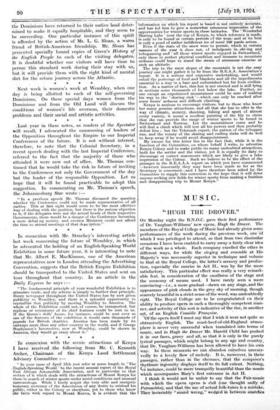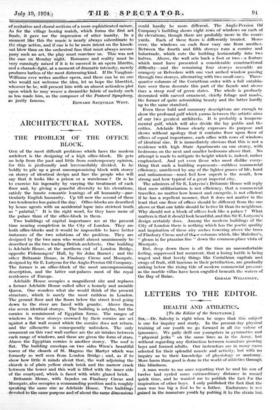MU SIC.
"HUGH THE DROVER.".
ON Monday night the B.N.O.C. gave their first performance of Dr. Vaughin-WilliamS' new opera; Hugh the Drover. The members of the Royal College of Music had already given some performances of the work during the previous week, one' of which I Was privileged to attend, so that from two dissimilar occasions I have been enabled to carry away a fairly clear idea of the work as a whole. Each company excelled the other in different ways, for while the singing and ensemble at His Majesty's was necessarily superior in technique and volume to that at the Royal College, the latter's scenery and Produc- tion, eapeCially the sunrise in Act II., was "by far- the. more satisfactory. This particular effect was really a very remark- able feat, in consideration of the smallness' of the stage and the economy of means used. I haVe rarely seen 'a more convincing—i.e., a more gradual—dawn on any stage, and the appearance of pink clouds in the grey sky of morning, though scarcely beautiful in a strict sense of the word, was undoubtedly right. The Royal College are to be congratulated en their ability to produce opera in such a thoroughly competent man- ner, and activity Of this sort is indieatiVe of -the rise, in another art, Of an English Coinedie-Franeaise.
Of the opera itself I must say that I wish it were not quite so obtruSively English:- The roast-beef-oVold-England atmos- phere is never very successful when translated- into terms of music, and in Hugh the Drover- Mr. Harold Child has pushed it in our faces, gravy and all, so that it is only in the purely lyrical passages, which might belong to any age and country, that Dr. Vaughan-Williams has been allowed to have his own•Way. these moments we Can abandon aurselVes unreser- vedly to a lovely flow of melody. _ It is, moreover, in theta passages, rather than in the chdruses, that the composer's rhythmic. ingenuity displayi itself to its full extent. Nothing, for instance; Could be more tranquilly beantiftil than the music which accompanies Mary's first entrance" in Act II.
I think it would - not be unfair to say that the Fair-music with ahidi the opera opens is dull (one thought sadly of Petrouchka), and that the use of actual folk-tunes is a mistake. They invariably sound"wrong," wedded in lieiweeri snatches of recitative and choral sections of a more sophisticated nalmre. As for the village boxing match, which forms the first act finale, it gave me the impression of utter inanity. In a moment like this tbe music is nearly always subordinate to _the stage action, and if one is to be more intent on the knock- out blow than on the orchestral fuss that Must always accom- pany such an act, the play must convince us.- This was not the case On Monday "night. Romance and, reality must be very cunningly mixed if it is to succeed in an opera libretto, and a charade-fight, at a moment of dramatic intensity, merely produces bathos of the most distressing kind. If Dr. Vaughan- Williaina ever writes another opera, and there can be noone who would not welcome the idea, let us hoi)e, the librettist, whoever he be, will present him with an almost actionless plot upOn which he may weave- a dreamlike fabric Of melody such as has made him, as the composer of the Pastoral Symphony,
So justly famous. EDWARD SACKVILLE WEST.







































 Previous page
Previous page